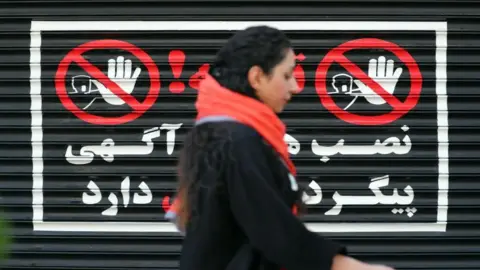Iran's politicians to debate hijab laws in secret
 ABEDIN TAHERKENAREH/EPA
ABEDIN TAHERKENAREH/EPAIranian MPs have voted to review a controversial hijab law behind closed doors - meaning it is likely there will be no public debate on the matter.
The so-called Hijab and Chastity Bill would impose a raft of new punishments on women who fail to wear the headscarf.
It was drafted in response to months of mass protests triggered by the death in custody of a woman who was accused of not wearing her hijab correctly.
Parliament will now be able to approve a three to five year trial of the bill.
Iran's Council of Guardians - the country's most powerful legislative body - will first have to approve this.
Once the trial begins, MPs will then be able to change the legislation, ultimately making it a permanent law.
MPs called on Article 85 of Iran's constitution to progress the legislation, which allows a parliamentary committee to review bills without public debate.
The vote, which took place in an open session of parliament, saw 175 members vote in favour of the move, while 49 voted against it.
Member of parliament Mohammad Rashidi said MPs will vote to determine how long it should be implemented for "experimentally".
However MP Gholamreza Nouri-Qezeljeh warned that the move came with "dangers", especially since a large portion of the bill focuses on "criminalising and punishing" hijab-related violations.
The hijab is a powerful political symbol in Iran - both for the ideology of the clerical establishment, and for the women protesting against being told what to wear.
Many women have been openly flouting the dress code laws - by either wearing their headscarf incorrectly or not wearing one at all - in protest at the death in police custody of Mahsa Amini, 22, who had been arrested for allegedly breaking the strict hijab rules.
Her death sparked months of mass protests in Iran, which saw the morality police unit temporarily pause their controversial street patrols to enforce the dress code. However they resumed last month.
It is not the first time Iran has implemented Article 85 to force through legislation that curbs civil rights.
In August 2021, politicians voted in favour of using it to review a draconian internet bill - a decision that was met by fierce criticism from human rights groups.
